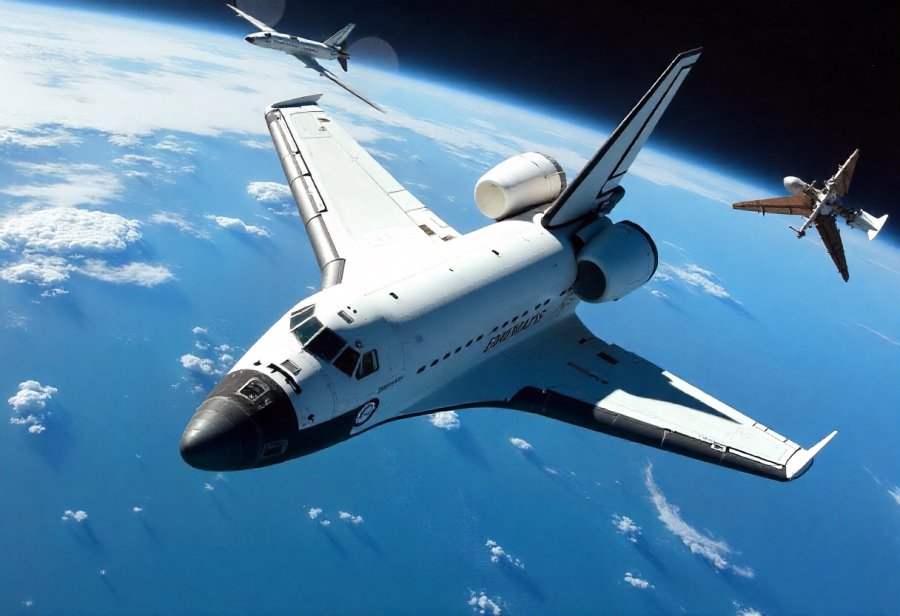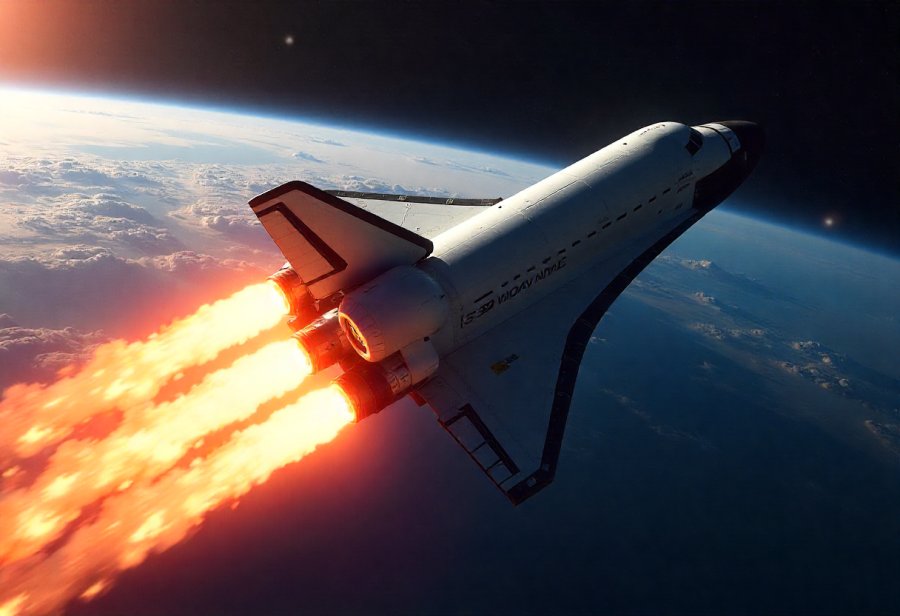The final voyage of NASA’s Space Shuttle Atlantis in 2011 marked a monumental milestone in human space exploration—celebrating nearly 30 years of technological innovation, resilience, and international collaboration. This historic mission not only delivered vital supplies to the International Space Station but also symbolized a transition toward new paradigms of space travel, including partnerships with commercial entities like SpaceX and Boeing. As the shuttle’s legacy of groundbreaking achievements—from satellite deployment to station assembly—continues to influence future exploration, it raises compelling questions: How will this legacy shape the next frontier of lunar and Martian missions? Beyond hardware, Atlantis’s story ignited a global cultural movement, inspiring generations and fostering pride in human ingenuity. This remarkable journey exemplifies how perseverance, adaptability, and collective effort forge the path into the cosmos—reminding us that space exploration remains one of humanity’s most inspiring and enduring pursuits.

Celebrating Humanity’s Achievement: Atlantis’s Final Space Shuttle Mission
In 2011, NASA’s Space Shuttle Atlantis made its historic final flight, marking the end of an era that spanned nearly 30 years of human space exploration. This mission was more than just the last journey of a spacecraft; it symbolized the culmination of decades of technological innovation, teamwork, and international collaboration that have expanded our understanding of space. As Atlantis prepared for launch from Kennedy Space Center, it carried with it a sense of achievement and reflection—an emblem of human perseverance and curiosity.
The mission’s primary goal was to support the continued development and maintenance of the International Space Station. Atlantis delivered vital supplies, scientific equipment, and crew members, ensuring the station’s operations and research could proceed smoothly. This logistical role underscored the shuttle’s importance in enabling groundbreaking experiments that benefit life on Earth. Watching the launch, millions worldwide felt a mix of pride and nostalgia, recognizing this flight as both a farewell and a celebration of human ingenuity.
Atlantis’s career in space was marked by a series of landmark achievements. From deploying satellites and repairing the Hubble Space Telescope to helping assemble the International Space Station, it became a symbol of resilience and versatility. The shuttle’s design evolved over time, incorporating upgrades that extended its operational life and capabilities. Its final mission was a testament to these ongoing improvements, demonstrating that legacy spacecraft can remain relevant through careful maintenance and innovation.
This last flight also represented a pivotal moment for NASA and global space exploration efforts. It highlighted the shift from reliance on government-operated shuttle fleets to partnerships with commercial providers like SpaceX and Boeing. Atlantis’s legacy helped pave the way for this transition, emphasizing that progress often involves embracing new technologies and collaborative approaches. Its journey inspired confidence in the future of spaceflight, including plans for lunar and Martian exploration.
Throughout its service, Atlantis showcased advanced robotic systems and onboard upgrades that pushed the boundaries of automation and remote operations. Its robotic arm played a crucial role in station assembly and payload handling, advancing robotic technology for future missions. These innovations continue to influence upcoming exploration efforts, extending Atlantis’s impact well beyond its final flight.
The mission also stirred a global dialogue about the future of space exploration. It prompted reflections on what humanity has achieved and what lies ahead. As the shuttle’s final journey concluded, it left behind a legacy of resilience, innovation, and international cooperation. This historic flight remains a reminder that human curiosity and collaborative spirit are the driving forces behind our ongoing journey into space.
Legacy of Resilience: How Atlantis’s Last Flight Shaped the Future of Space Exploration
The final flight of Atlantis in 2011 left a lasting mark on the future of space exploration. Despite its age, the shuttle’s durability and the upgrades it received over the years proved that with careful maintenance and innovation, legacy spacecraft can remain vital tools for advancing human knowledge. This mission demonstrated that resilience isn’t solely about designing new systems but also about preserving and improving what we already have, setting new standards for spacecraft longevity and reliability.
Atlantis’s last journey also reinforced the importance of international collaboration. Over its decades of service, the shuttle became a symbol of global teamwork, supporting the construction and operation of the International Space Station. Its successful final mission underscored how shared effort, expertise, and resources foster trust among nations, shaping a cooperative framework that continues to underpin current and future space endeavors.
The end of the shuttle program prompted NASA to shift focus toward working with commercial partners like SpaceX and Boeing. Atlantis’s legacy helped pave the way for this transition, showing that embracing new partnerships and technologies can create more flexible, cost-effective ways to reach space. The lessons learned from Atlantis’s operational history continue to inform the development of upcoming missions, including lunar exploration and Mars ambitions.
Technological advancements showcased during Atlantis’s final missions, particularly in robotics and onboard systems, pushed the boundaries of automation in space. Its robotic arm played a vital role in station assembly and payload handling, demonstrating the potential of remote operations. These innovations are now central to future exploration efforts, enabling automated cargo deliveries and planetary surface work, extending Atlantis’s influence into a new era of space technology.
Beyond hardware and technology, Atlantis’s last flight inspired a broader cultural legacy. Its iconic image became a symbol of human perseverance and ingenuity, fueling inspiration across generations. Memorials, exhibitions, and educational programs continue to celebrate its achievements, fostering curiosity and pride in space exploration and encouraging young minds to pursue careers in STEM fields.
Looking ahead, the impact of Atlantis’s final mission remains a blueprint for the future. It showed that resilience, collaboration, and innovation are essential for overcoming challenges and reaching new frontiers. Its legacy reminds us that progress in space is not just about technological breakthroughs but also about maintaining a spirit of shared human effort and curiosity, driving us to explore beyond our planet with confidence and purpose.

Lessons from the Last Voyage: Reflection and Insights on Atlantis’s Final Mission
The final flight of Atlantis in 2011 offers powerful lessons about resilience and innovation in space exploration. Despite its age, the shuttle’s robust design and ongoing upgrades demonstrated that with careful maintenance, legacy spacecraft can remain relevant and capable of supporting groundbreaking missions. This flight reinforced that durability isn’t just about building new systems but also about preserving and enhancing what already exists. Atlantis’s successful mission set a new benchmark for spacecraft longevity, inspiring confidence that complex vehicles can be maintained over decades with diligent care.
This mission also highlighted the vital role of international collaboration. Over its decades of service, Atlantis became a symbol of global teamwork, supporting the construction and operation of the International Space Station. Its final journey exemplified how sharing knowledge, resources, and expertise among nations fosters trust and accelerates progress. These partnerships have become foundational to current space efforts, proving that working together across borders leads to more resilient and innovative exploration capabilities.
The end of the shuttle program prompted NASA to rethink its approach to space transportation, shifting reliance toward commercial partners like SpaceX and Boeing. Atlantis’s legacy helped pave the way for this transition by demonstrating that embracing new technologies and collaborations can create more flexible and cost-effective solutions. Lessons from Atlantis’s operational history continue to influence the development of future missions, whether to the Moon, Mars, or beyond, emphasizing adaptability and continuous improvement.
Technological advancements showcased during Atlantis’s final flights, particularly in robotic systems and onboard upgrades, pushed the boundaries of automation and remote operations. Its robotic arm was crucial for station assembly and payload handling, advancing robotic capabilities that now play a central role in upcoming exploration efforts. These innovations extend Atlantis’s influence into a new era, enabling more autonomous and efficient space missions that build on its legacy of technological progress.
Beyond its hardware and systems, Atlantis’s last journey inspired a broader cultural legacy rooted in human perseverance and curiosity. Its iconic image became a symbol of what can be achieved through collective effort and dedication, fueling inspiration across generations. Memorials, exhibitions, and educational initiatives continue to celebrate its achievements, nurturing curiosity and pride in space exploration. The story of Atlantis’s final flight serves as a reminder that exploration is a shared human endeavor, driven by resilience, innovation, and the relentless pursuit of discovery.
As the legacy of Atlantis continues to influence modern space initiatives, embracing innovative technologies remains essential for future success. For those interested in the ongoing advancements inspired by Atlantis, exploring the role of sustainable spacecraft design can provide valuable insights, which you can learn more about at Sustainable Spacecraft Design.
Beyond the Stars: The Cultural and Public Impact of Atlantis’s Historic Journey
The final mission of Atlantis resonated beyond the technical achievements and scientific milestones; it also left a deep imprint on public perception and culture. Media coverage transformed the shuttle’s journey into a symbol of human perseverance, ingenuity, and collaborative spirit. Documentaries, exhibits, and news stories helped make space exploration more accessible and inspiring, fostering a collective sense of pride and curiosity that transcended national borders. These narratives reinforced the idea that reaching for the stars is a shared human endeavor driven by determination and teamwork.
This historic flight significantly boosted educational interest in STEM fields. Students and teachers alike watched Atlantis’s final ascent and landing with awe, sparking enthusiasm for science, engineering, and exploration. Schools and science centers incorporated the mission into their curricula, emphasizing how space pushes the boundaries of what’s possible. The iconic images of Atlantis soaring into the sky or landing safely became powerful symbols that encouraged young minds to dream bigger and consider careers in innovation and discovery.
Politically, the mission prompted a reevaluation of space policy and international cooperation. Leaders recognized that sustainable progress depends on shared resources, expertise, and diplomatic trust. The success of Atlantis’s last flight underscored that global partnerships—built on transparency and mutual benefit—are essential for future space endeavors. This shift has shaped policies that promote collaboration with private industry and international allies, emphasizing that space exploration is a collective pursuit with broad support.
Culturally, Atlantis’s departure rekindled a sense of wonder and possibility. Artists, writers, and filmmakers drew inspiration from its historic journey, creating works that celebrate human resilience and curiosity. Memorials and exhibitions serve as enduring reminders of what humanity can achieve through dedication and teamwork. These cultural reflections help keep the spirit of exploration alive, inspiring new generations to pursue their own journeys into the unknown.
The mission also influenced how society views the broader value of space exploration. It fostered a sense of collective pride and curiosity, emphasizing that progress comes from shared effort and innovative thinking. The story of Atlantis’s final flight highlights that human exploration is rooted in resilience, collaboration, and the relentless pursuit of knowledge—values that continue to motivate ongoing investments and policy support for future missions.
Looking ahead, the legacy of Atlantis’s last journey provides a blueprint for ongoing exploration. It reminds us that resilience, international cooperation, and technological innovation are vital to overcoming new challenges. The cultural and public engagement sparked by the mission continues to inspire a spirit of curiosity and collective effort. As new missions unfold, the story of Atlantis encourages us to embrace the power of unity and perseverance in our ongoing quest to explore beyond Earth.

Enduring Inspiration: Summing Up the Legacy of Atlantis’s Last Flight
The last flight of Atlantis in 2011 marks a pivotal moment in the story of human space exploration. It symbolizes more than the end of a spacecraft’s operational life; it embodies nearly three decades of resilience, innovation, and international cooperation that have shaped our journey beyond Earth. Atlantis’s career showcased how continuous upgrades and careful maintenance can keep legacy spacecraft relevant and capable of supporting groundbreaking missions, setting new standards for durability and reliability in space technology.
This mission reinforced the vital role of global partnerships. Over its long service, Atlantis supported the construction and maintenance of the International Space Station, becoming a symbol of international teamwork. Its success demonstrated that shared efforts, combined expertise, and pooled resources foster trust and accelerate progress—values that continue to underpin current and future space initiatives. The collaborative spirit fostered through Atlantis’s legacy reminds us that space exploration benefits from working across borders.
The shift toward reliance on commercial partners like SpaceX and Boeing has been a significant development since Atlantis’s retirement. Its legacy helped pave the way for this transition, showing that embracing new technologies and partnerships can lead to more flexible, cost-effective exploration strategies. Lessons learned from Atlantis’s operational history continue to influence upcoming missions, whether to the Moon, Mars, or beyond, emphasizing adaptability and continuous innovation.
Technological advancements, particularly in robotics and onboard systems, stand out as key highlights of Atlantis’s final missions. Its robotic arm played a crucial role in assembly and payload handling, pushing forward automation capabilities that now underpin many modern space operations. These innovations extend Atlantis’s influence into a new era, making space missions more autonomous, efficient, and capable of tackling complex tasks remotely.
Beyond hardware and systems, Atlantis’s journey inspired a cultural legacy rooted in human perseverance and curiosity. Its iconic image as a symbol of collective effort and dedication continues to motivate generations. Memorials, exhibitions, and educational programs keep its story alive, fostering pride and inspiring young minds to pursue careers in science, engineering, and exploration. Its enduring image encapsulates the spirit of discovery that drives us forward.
The mission’s broader impact touches on how society perceives space exploration’s value. It cultivated a sense of collective pride and curiosity, emphasizing that progress depends on shared effort, innovation, and international cooperation. The success of Atlantis’s final journey highlighted that exploration is a human endeavor—one fueled by resilience, collaboration, and the relentless pursuit of knowledge.
Looking ahead, the legacy of Atlantis’s last flight offers a blueprint for future exploration. It reminds us that perseverance, adaptability, and unity are essential to overcoming new challenges and reaching distant horizons. Its story encourages a mindset that values continuous improvement and shared effort, ensuring that humanity’s quest to explore beyond Earth remains inspiring and sustainable.
In the end, Atlantis’s final mission leaves us with a powerful reminder: exploration is a collective human pursuit driven by resilience, innovation, and curiosity. Its legacy demonstrates that progress is built on lessons from the past, combined with an unwavering commitment to pushing boundaries. As we venture into new frontiers, the story of Atlantis continues to inspire us to reach further, dream bigger, and explore together with purpose and hope.







